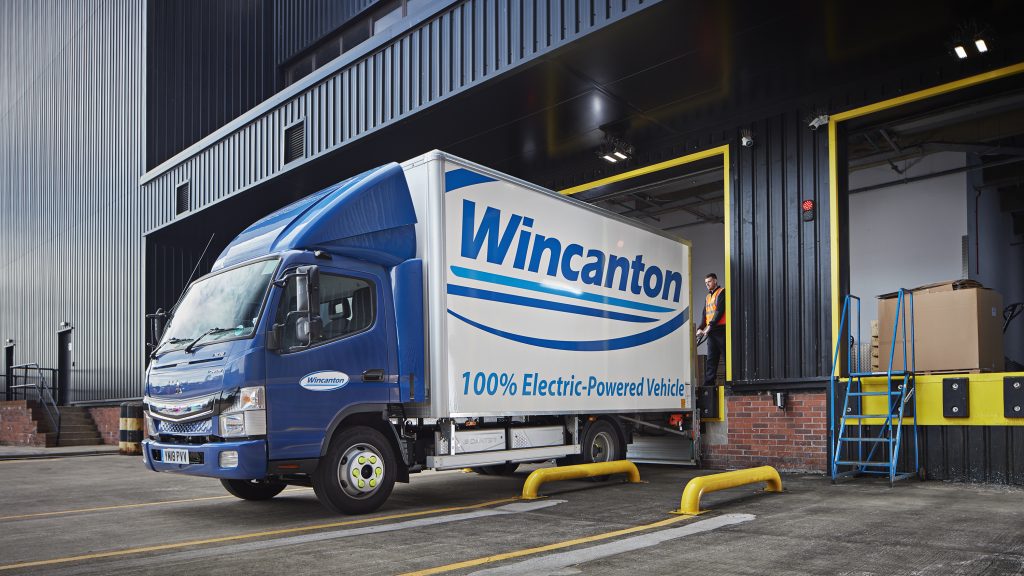Carl Hanson, group procurement and fleet director at Wincanton, explains how electric delivery trucks and alternative fuels are helping to clean up Wincanton’s fleet operations
How are the FUSO eCanters being used? What range are you getting and where are they re-charged?
Wincanton’s fleet of FUSO eCanters form part of its last mile and urban delivery operation. Using the vehicles in this way maximises the benefits of the reduced emissions and mitigates against challenges around range and charge frequency.
Typically, these vehicles have a range of up to 100 miles, but this depends on a number of factors. Weather conditions make a real impact on range – for example in winter heaters are needed to clear windscreens, while in the summer air conditioning is necessary to cool cabins.
These are the same challenges faced by diesel and petrol-powered vehicles; but with reduced range, there is more emphasis on smart route planning and optimising loads.
All of the vehicles are fully charged at their base depots overnight ready for their planned routes the following day. Current infrastructure limits the opportunity to charge vehicles while ‘out on the road’, so this is the best approach for Wincanton as a business.
How was the process of building a business case for electric vehicles?
Wincanton is always exploring new approaches as it looks to be more sustainable and efficient in everything it does; after all, sustainability is no longer an option, it’s essential for all businesses. It has, and continues to, trial options such as LNG (liquefied natural gas) vehicles, and has onboarded telematics technology as it pushes for greater efficiency across its operations.
With changes in legislation on the horizon for all commercial operators, it’s the business’ responsibility to understand and prepare for the impacts of these, both for itself and its customers.
Restrictions around emissions (such as London’s Ultra Low Emission Zone) are already influencing the industry, so Wincanton needs to have economically viable solutions to support its customers.
The major challenges are around cost and range of the individual vehicles. Efficient planning of drops to optimise the range that can be covered is essential for maximising the the cost benefit of electric over a traditional unit.
Manufacturers themselves will have to reduce C02 emissions across the range of vehicles they build by 2025, so this will, in theory, speed up the rate of electric-powered units produced. Currently there aren’t many viable alternatively powered commercial vehicle options – especially for large, heavy fleets – which needs to be addressed to support all UK industries, including logistics.
Are you using other alternative fuels, such as natural gas?
Wincanton has been trialling LNG as an option for its long-haul HGVs. There are benefits to this approach, but until we have a true idea of the environmental and economic impacts of this particular alternative fuel, it’s difficult to fully commit.
We are also looking to trial HVO (hydrotreated vegetable oil) where possible. But, again, a full assessment of the impacts and benefits of this fuel is needed.
The main question around alternative fuels is ‘are they readily available at an economically viable cost to power a large fleet?’.
How are you addressing last mile delivery challenges?
Many of Wincanton’s last mile deliveries are for large, heavy items (such as furniture) handled by its Home & eFulfilment sector. When compared to operators in the parcel delivery business, these home deliveries, typically, span larger areas and are less dense in frequency.
On average, they are five miles apart so it’s less viable to use only electric vehicles. The range on a single charge can’t support enough individual drops to make electricity feasible to power the entire fleet, both in terms of cost and customer satisfaction.
Wincanton has operations that do utilise electric vehicles, which requires smart planning around routing, and flexibility around delivery dates and times. There have been notable success stories in this area; the knowledge gained has been valuable.
Source: https://greenfleet.net/
FLEET MANAGEMENT NEWSLETTER
Join to our NEWSLETTER; you’ll get the latest news, articles, publications, training, conferences, events, congresses, and white papers related to Fleet Management, Mobility and Automotive IN your email fortnightly.




